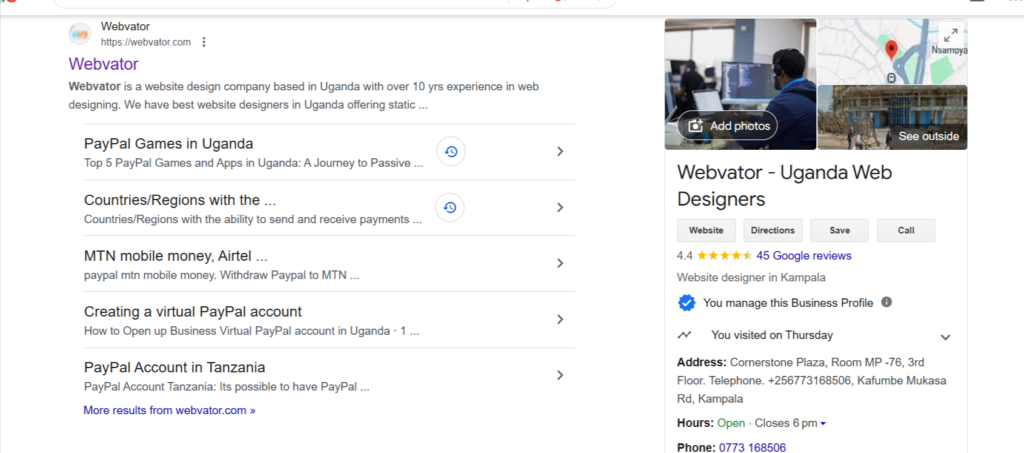Should i trust someone to setup for me a PayPal account since am living in a country not allowed to receive
Many people find themselves needing a functional PayPal account to receive payments from various sources such as friends abroad, online freelancing platforms like Upwork, games, TikTok, or other digital services. Unfortunately, PayPal accounts created within restricted countries like Uganda, Namibia, Tanzania are restricted from receiving payments. This limitation has led many to explore alternative options, including using relatives’ or friends’ PayPal accounts in other countries or seeking help from service providers like Webvator, a web design and IT consultancy firm, to create receiving PayPal accounts.
In this article, we’ll address whether it is safe to trust someone to set up a PayPal account for youto be able to receive. The short answer: it is not entirely safe, especially if the individual or service provider lacks credibility or a physical office.
If you decide to seek assistance from someone to set up your PayPal account, it’s crucial to prioritize your privacy and security. Whenever possible, arrange to meet the person in person and perform the setup process on your own phone or computer. Take full control by entering your own password and typing in all your details yourself, ensuring that sensitive information remains confidential. The person assisting you should serve as a guide, providing instructions and clarification rather than directly filling in the details for you. Don’t hesitate to ask questions where you need further understanding. Remember, this is a professional service, and there is likely a consultancy fee involved. Treat it as a paid service rather than free help, as you are compensating them for their expertise and support. This approach not only safeguards your information but also ensures a professional and transparent process.
Why It Might Not Be Safe
Risk of Scams
Numerous people have reported being scammed by online service providers who promise to deliver but disappear after receiving payment. Many lack professionalism, customer care, and accountability. Worse, once payment is made, clients often find themselves begging for support from individuals who ignore calls or turn off their phones.
Security Concerns
When someone sets up a PayPal account for you, they gain access to sensitive information, including passwords. A dishonest service provider could:
-
Add a secondary email to your PayPal account, allowing them to reset the password and gain control of your account.
-
Retain access even after you change the password, putting your funds at risk.
Given these risks, you need to be extremely cautious if you’re considering this option.
Tips to Safely Set Up a PayPal Account Through a Service Provider
If using a service provider is your only option, here are key precautions to take:
1. Choose a Verified Company, Not an Individual
-
Work with a reputable company that has a verified Google Maps address and positive reviews. This makes it easier to trace them if issues arise.
-
For example, Webvator offers PayPal consultancy services and has over 10 years of verified business reviews and a physical office.
-
 Avoid dealing with individuals who lack a physical address or credible online presence.
Avoid dealing with individuals who lack a physical address or credible online presence.
2. Ensure the Email Is Yours
-
The email address associated with the PayPal account must belong to you since it’s where payments will be sent.
-
Double-check that no unauthorized secondary email addresses are added to your account.
3. Verify the Service Provider’s Credibility
-
Avoid service providers who only have a social media page but no website. Why trust an IT professional offering online services who cannot maintain their own website?
-
Check if their contact details match across platforms. It’s quite suspicious and unprofessional to deal with someone who introduces themselves as “Denice,” yet their MTN mobile money account is registered under the name “Smith,” their Airtel line is names of “Matiya,” their LinkedIn profile identifies them as “Daniel,” and their Facebook profile goes by “Jenipher.” Such inconsistencies in names across different platforms and services raise significant red flags. It creates an impression of dishonesty or a potential scam, as it becomes challenging to verify the person’s true identity. Trusting someone with such conflicting information can lead to serious risks, especially when dealing with sensitive matters like financial accounts or personal data. Always prioritize working with individuals who are consistent, transparent, and verifiable in their identity.
4. Avoid Service Providers Who Refuse to Meet in Person
-
A legitimate service provider should be willing to meet you at their office or a verified location.
-
If meeting isn’t possible, ensure their online presence is traceable and verified.
5. Use Remote Access Setup
-
During the PayPal setup process, opt for remote access tools like AnyDesk. This allows you to control the process, enter your password privately, and ensure your sensitive details remain confidential.
6. Avoid Sharing Identity Documents
-
Do not share photos of your ID with anyone. If PayPal requests identity verification, upload it yourself directly on the platform.
7. Change Your Password After Setup
-
Once the account is set up, change the password to something only you know. It’s advisable to wait at least 24 hours after the setup to ensure the account is fully activated.
Final Note: Proceed at Your Own Risk
It’s important to remember that PayPal’s terms of service do not permit third-party account setups. Allowing someone else to set up an account for you is a risk you take voluntarily.
However, if you follow the precautions outlined above and work with a credible service provider like Webvator, and others you can minimize the risks involved. Always prioritize security and accountability when dealing with sensitive financial platforms like PayPal.
